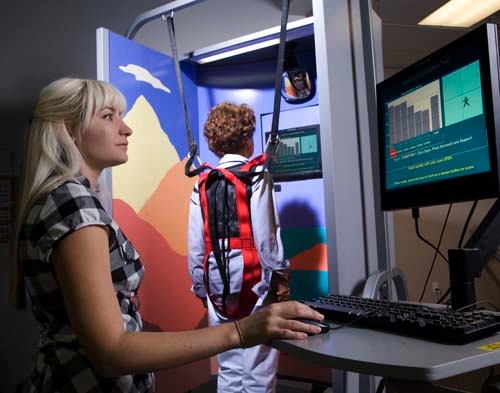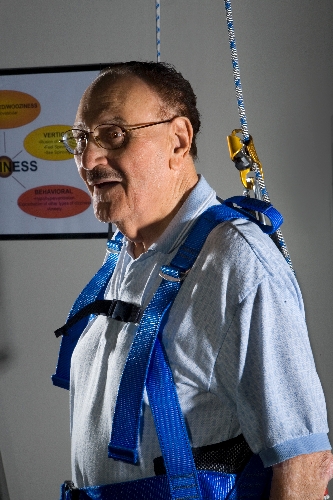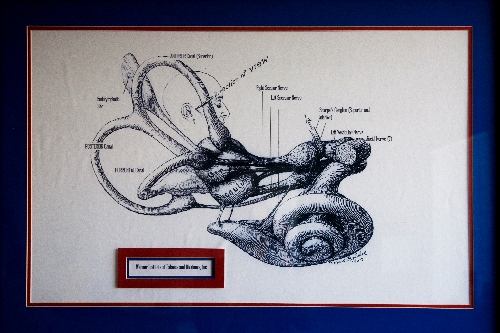Easily Swayed: Millions of aging Americans battle dizziness




If you want a Global Positioning System for your car, you have to buy it — unlike your body’s very own GPS, which comes as standard equipment.
And when your car’s GPS goes haywire, you can always buy a new one.
If only it were that easy for millions of aging Americans struggling with dizziness and balance problems.
"Compared to younger persons, dizziness in older people is not only more common but it is also more persistent, has more causes, is less likely to be due to a psychological cause, and is more incapacitating," according to an article by Dr. Timothy C. Hain , professor of neurology, otolaryngology and physical therapy/human movement science at Northwestern University Medical School. (Hain’s medical practice website signals his specialty: http://dizzy-doctor.com.)
"Unfortunately, it’s a fairly common problem," according to University Health System neurologist Miracle Wangsuwana , assistant professor of medicine at the University of Nevada School of Medicine.
"It’s just a guess based on my own experience, but among older people, at least 70 percent are going to get some sort of dizziness," Dr. Wangsuwana says.
"As we all get older, it’s normal for us not to be as nimble," because of "diminished hearing and eyesight and less muscle tone," he explains.
Dizziness or feeling off-balance may be common problems, but determining their causes can be considerably more complicated, notes Dr. Syed Rahman of Oasis Medical Associates of Henderson, who specializes in internal medicine and geriatrics.
"Balance is kind of a complex thing," he says. "Your brain constantly receives input" from your eyes and inner ears, "integrating all your impulses," much like a personal GPS.
As for what causes dizziness and balance problems, "it could be low blood pressure," Wangsuwana says. "It could be low blood sugar. It could even be something as sinister as a stroke."
Which is why, if a patient experiences "sudden-onset dizziness," he or she should seek medical attention immediately, Wangsuwana advises.
Regular checkups to monitor blood pressure can help prevent blood pressure-related dizziness, he notes, which is vital because, "for someone who’s getting light-headed from low blood pressure and that’s untested, that can cause things like stroke."
Other possible causes range from neuropathy (which can trigger numbness, pain or tingling in the legs and feet) to prescription side effects, the doctors point out.
"A lot of antibiotics affect the ear, balance and hearing," says Rahman, who suggests patients should ask doctors about possible side effects of all medications.
In addition, "if you take more than 10" prescription medications, "the chance of side effects and interactions is nearly 100 percent," he says, suggesting patients "try to cut down on medication."
If you’re wearing old eyeglasses, perhaps a visit to the eye doctor is in order, Rahman notes.
Even something as simple as drinking plenty of water during triple-digit Southern Nevada summers can help seniors stay balanced, he suggests, because "if you get dehydrated, the blood supply to the brain" drops.
"The list for (causes of) dizziness and loss of balance is quite extensive," Wangsuwana says, including Parkinson’s disease and Meniere’s disease, which is associated with hearing loss and ringing of the ears.
One of the most common dizziness conditions, he says, is another inner-ear problem, benign positional vertigo — BPV for short.
Although its name "says benign, it hardly feels benign" to sufferers, Wangsuwana explains. "They feel like the room is spinning," or they’re spinning, and "it’s usually associated with nausea."
According to an article by "Dizzy Doctor" Hain, about 50 percent of dizziness is caused by BPV "by the age of 80, compared to about 20 percent for all ages considered together."
The cause of BPV, or another form of dizziness or imbalance, may be minor.
But the consequences of even minor dizziness can be major — especially if the problem causes a fall, Rahman points out.
"A lot of the elderly have their own set routine," he says — until a fall puts them in the hospital and "everything goes downhill."
In addition to the physical consequences, a fall’s psychological impact can be profound, Rahman notes, serving as "a tipping point" for older patients.
"You previously had this independent, proud person," he says. Then, after a fall, "all of a sudden, Mom can’t do anything."
Even the fear of falling can have consequences, according to physical therapist Brian Werner , president of the Werner Institute for Balance & Dizziness, which treats patients for dizziness and balance problems in Summerlin and Henderson.
Between $32 billion and $35 billion are spent annually "on management of post-fall care," Werner says, citing National Institutes of Health statistics.
"What happens to seniors is, as they become more sedentary, they don’t use their balance as much," he explains. That in turn leads to fear of falling, and "that fear cocoons them into atrophy."
What the institute’s physical therapists "try to do with our therapy is to break that inactivity cycle," says therapist Trish Brown, clinic manager.
When patients first visit the institute, they undergo a variety of tests — including one to check the inner ear, which Brown describes as "your tilt sensor."
Additional tests determine whether a patient’s left and right inner ears are in balance and whether a patient can walk while turning his or her head.
Some of the testing and treatment equipment used at the Werner Institute were developed by NASA to measure astronauts’ balance following extended time in space.
Patients undergoing physical therapy there also wear harnesses to prevent falls — a technique that was inspired by Werner’s background as a gymnast.
After all, gymnastics is "all about balance," he says, recalling how he’d wear a harness every time he was learning a new trick or technique.
By "starting patients in the harness, they know they’re safe," Werner notes.
Therapists then "introduce balance challenges in an attempt to turn their ears back on" he notes, in the process encouraging patients to step outside their comfort zone and retrain their sense of balance.
After all, even Olympic ice skaters who jump and spin with ease fall at first, Brown points out, until, "through time, the brain gets conditioned" to a wider range of movement.
Although there’s "no specific exercise to prevent loss of balance and dizziness," according to Wangsuwana, "light exercise and activity, such as dancing, usually help maintain a healthy body."
And while many believe age is the cause of dizziness and imbalance, "it’s not really age, it’s health," Werner maintains. "It’s quality of life. Having a balance problem makes" a patient’s "quality of life significantly worse."
Contact reporter Carol Cling at ccling@reviewjournal.com or 702-383-0272.
Balance Self TestAnswer these questions to help determine if you may have a balance or dizziness disorder. If you answer "yes" to one or more, you may be at risk. The best way to determine if you have a problem is to talk with your physician.
1. Have you fallen more than once in the past year?
2. Do you feel dizzy or unsteady if you make sudden changes, such as bending down or turning quickly?
3. Do you feel unsteady when you are walking, climbing stairs or stepping up or down a curb?
4. Do you feel unsteady walking on uneven surfaces such as grass, gravel or sand?
5. Do you have difficulty sitting down or getting up from a seated or lying posi
tion?
6. Have you had a stroke or other neurological problem that has affected yo
ur balance?
7. Do you have numbness or loss of sensation in your legs or feet?
8. Do you use a walker or wheel chair, or do you need assistance to get around?
9. Are you inactive? (Do you walk or exercise less than 60-90 minutes total per week?)
10. Do you take medication for two or more of the following: heart disease, hypertension, arthritis, anxiety or depression?
SOURCE: Werner Institute for Balance & Dizziness
Internet resources:
• National Institutes of Health
• MayoClinic.com
• Dizziness-and-balance.com
• Werner Institute for Balance & Dizziness












